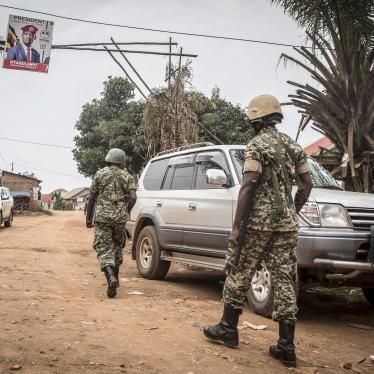(New York) - Two Kenyan activists working on the cases of suspects charged with terrorism for the July 11, 2010 Kampala bombings have been illegally detained in Uganda and are at risk of abuse, Human Rights Watch said today.
Human rights activist Al-Amin Kimathi of the Kenyan Muslim Human Rights Forum and Kenyan lawyer Mbugua Mureithi were arrested on September 15, 2010, when they arrived at Entebbe airport, and taken to the Ugandan police's Rapid Response Unit headquarters in Kireka, Kampala. The Rapid Response Unit has a history of committing serious violations against criminal suspects, including torture and extrajudicial executions, and regularly detains individuals unofficially in its offices in Kireka.
"The Ugandan police should immediately bring these individuals to lawful places of detention and clarify the reasons for their arrest," said Rona Peligal, Africa director at Human Rights Watch. "Police officials in Kireka should know that they will be held responsible if either of these human rights defenders is mistreated."
The Kenyan activists traveled to Uganda to attend the scheduled hearing of 34 terrorism suspects. The Ugandan lawyer representing some of the suspects, Ladislaus Rwakafuuzi, expected Mureithi to attend the hearing on September 16, as he had on September 2 when the suspects last appeared before the court, but Mureithi never appeared.
Rwakafuuzi grew concerned and eventually learned that both Mureithi and Kimathi had been taken to Kireka. A police official confirmed to a media inquiry that the two are in custody but did not specify where they were being held. Kireka is not designated under Ugandan law as a lawful place of detention, though criminal suspects are often held there for long periods of time. It is not clear on what grounds Muriethi and Kimathi would have been arrested. Rwakafuuzi told Human Rights Watch that he remains concerned for his safety if he continues to represent the terrorism suspects as their case proceeds.
Kimathi and Mureithi have been outspoken critics of the way in which Kenyans have been sent to Uganda to face prosecution for the July 2010 bombings without appearing before Kenyan judges. In August, Mureithi, who represents the families of suspects in Ugandan detention, told the media that the Kenyan government had made no attempts to follow extradition procedures. He argued that without arrest warrants for the suspects in Kenya or court orders granting permission for the suspects to be removed from Kenya, the transfer of suspects from Kenya to Uganda amounted to "kidnapping."
Kimathi is a human rights activist who founded the Muslim Human Rights Forum in 2005, focusing on issues relevant to the Muslim community in Kenya. The organization rose to prominence in 2007 when it began documenting the arbitrary detention, secret expulsion, and unlawful rendition of dozens of men, women, and children who fled Somalia in 2006 and early 2007. After being detained in Kenya, they were subsequently transferred to Somalia and then Ethiopia. More than 100 people, including women and children as young as nine months old, were transferred by Kenyan authorities on several private charter flights, despite ongoing habeas corpus applications in the Kenyan courts. Almost all of the individuals were eventually released, but only after months of incommunicado detention in Ethiopia.
"The Ugandan police may not agree with the concerns Mureithi and Kimathi have raised about the suspects on trial, but that is no reason to lock them up," Peligal said. "All suspects have a right to legal counsel. These arrests look like pure harassment of human rights defenders because they're advocating for their clients."
The Rapid Response Unit, formerly known as the Violent Crack Crimes Unit and as Operation Wembley, has a broad and undefined mandate. Most suspects in the unit's custody are alleged to have committed armed robbery, though unit agents have been involved in other cases. For example, in September 2009, prominent journalist Robert Kalundi Sserumaga was arrested, beaten, and held overnight in Kireka after he made critical remarks about Ugandan President Yoweri Museveni's upbringing during a political talk show.
Human Rights Watch has documented multiple cases of torture and mistreatment of suspects held at Kireka. This year, at least two suspects have died while in the custody of agents affiliated with the Rapid Response Unit: Henry Bakasamba in May and Frank Sekanjjako in August. In both cases, suspects were beaten to death in the course of interrogations for alleged theft. Police have said that investigations into the deaths are under way. Eyewitnesses who saw the bodies have described to Human Rights Watch significant injuries, though post-mortem reports have not been made public.
"Given the history of serious abuses at Kireka, the Ugandan government must take urgent action to ensure that no harm comes to Mureithi and Kimathi," Peligal said.






